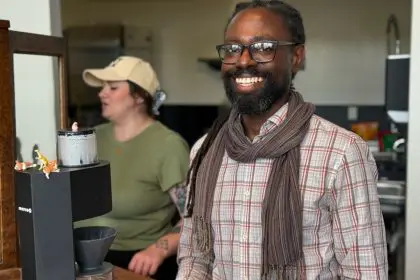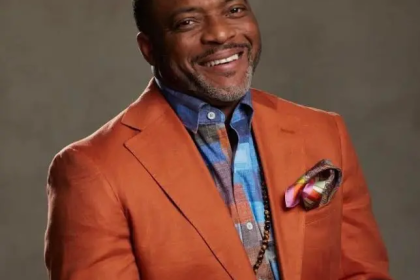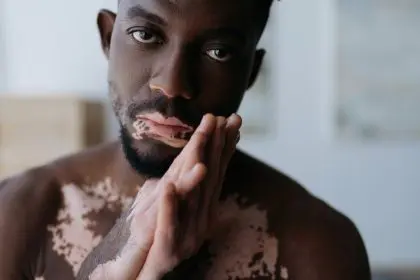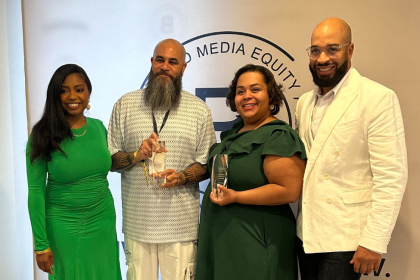The sleek office towers of corporate America seem worlds away from the century-old building in Detroit that now houses Soul Tribes International Ministries. Yet for Shaman Shu, the transition from real estate mogul to spiritual guide wasn’t as incongruous as it might appear. “Being woke doesn’t mean you have to be broke,” he says with the confident delivery of someone who has navigated both worlds successfully.
Before his spiritual awakening, Shaman Shu spent three decades in corporate real estate, buying and selling companies with the calculated precision expected of a CEO. That trajectory changed dramatically in 2020 when an experience with ayahuasca, a plant medicine used in traditional healing ceremonies, catalyzed what he describes as “a total spiritual change.”
“I started saying that I can share this with other people who cannot afford to go to other countries to have access to the healing,” he explains, his voice carrying both the measured cadence of a businessman and the passionate conviction of a convert. This realization became the genesis of his current mission—making sacred plant medicine accessible in urban environments, particularly to communities who have historically lacked access to both traditional and alternative healing modalities.
The 5 elements of spiritual entrepreneurship
The fusion of business acumen and spiritual practice forms the cornerstone of Shaman Shu’s approach. When asked how he balances these seemingly divergent realms, he outlines what could be considered his entrepreneurial philosophy:
Excellence is spiritual practice: “Whatever you’re doing, you want to be the best at it,” he insists. “If you are a candle maker, be the best candle maker. If you’re a butcher, be the best butcher.” This pursuit of excellence, he suggests, is itself a spiritual discipline.
Technology as sacred tool: Rather than rejecting modern technology in favor of ancient practices, Shaman Shu embraces both. Soul Tribes’ healing modalities are available through Roku, Amazon Fire Stick, and Apple TV, reaching potential clients in “200 million households.”
Community ownership: The purchase of a 100-year-old building in Detroit represents more than a real estate transaction; it’s a reclamation of space for healing. “We bought a 100-year-old building in the city of Detroit. We wrote legislation in our city to decriminalize sacred plant medicine.”
Integrity as foundation: When asked about navigating growth while maintaining mission integrity, his answer is straightforward: “I start 100% with that and make sure that I keep my integrity around that process.” This principled approach, he suggests, naturally attracts support.
Accessible healing: Perhaps most central to his vision is democratizing access to healing practices. “We went into the community and identified the top 100-plus ailments within our communities, and we created sacred teachings around those things.”
Ancient wisdom meets modern science
Shaman Shu’s approach to plant medicine is neither purely mystical nor strictly scientific, but an intentional bridging of both paradigms. “We’re fusing science with spirituality in our communities,” he explains, highlighting research showing how iboga, a plant from West Africa, helps people overcome heroin addiction, and how psilocybin mushrooms address post-traumatic stress and anxiety.
This synthesis represents a particular urgency in what he describes as “a mental health crisis.” His ministry offers alternatives to pharmaceutical interventions like OxyContin, Percocets, and fentanyl. “There is a plant literally on the planet to heal every element within your physical
body. There’s a plant that exists to heal every mental element of your mind, and there is a plant that deals with the spiritual realm.”
His approach to healing extends beyond plant medicine to encompass what he calls “the five elements” that comprise human existence: fire, earth, air, water, and space. These elements, he explains, offer pathways to release trauma that might otherwise manifest as physical ailments like high blood pressure or emotional triggers.
Spiritual identity as freedom
When asked about divine masculinity, Shaman Shu redirects the conversation toward a more expansive understanding of identity. “We’re just avatars,” he says, describing human bodies as “leather suits” that house spiritual beings. “Some people have light skin leather suits, some people have dark skin leather suits, some people have suits with stretch marks.”
This perspective allows him to address emotional repression commonly experienced by Black men without reinforcing rigid gender categories. “God gave us tear ducts for a reason,” he states, challenging cultural prohibitions against male emotional expression. “Our bodies are about 72% water. So including our tear ducts. When we start identifying that we’re mostly water beings, that means we have to find ways to release these things out of ourselves.”
This framework offers a distinctive approach to healing for communities where emotional vulnerability has often been discouraged or punished, particularly for men. Rather than framing emotional expression as gender nonconformity, he positions it as alignment with one’s elemental nature.
Expanding spiritual literacy
Perhaps most provocative is Shaman Shu’s challenge to religious exclusivity. Having grown up in a Christian household, “My father is a chaplain, my mother is a pastor. My uncle taught at Yale University pastoral care”, he understands the reluctance many feel toward exploring diverse spiritual traditions.
“Spirituality is the most discriminatory place of our entire life,” he observes. “People that get out here and talk about spirituality, and we’re anywhere in North America, you’re only talking about three books, the Bible, the Quran, and the Torah. You won’t even allow yourself to receive anything else.”
He compares spiritual exploration to culinary adventure: “It’s the same principle in spiritual systems. Let me learn something different. It will make me appreciate what I was born to do better.”
This openness to diverse spiritual practices informs Soul Tribes’ international orientation. Shaman Shu speaks of meeting with “shamans in West Africa and East Africa, and spiritual leaders out of Tibet and Thailand,” creating a global network of healing knowledge.
A ministry in movement
Soul Tribes represents more than a single ministry or healing center; it embodies what Shaman Shu describes as “a global phenomenon.” The name itself reflects his vision of a spiritually connected humanity, “we’re all connected…Soul Tribes is a global phenomenon.”
His ultimate goal transcends individual healing experiences: “My role is to push healing, to push spirituality around the world, and that’s what Soul Tribes is about.” This expansive vision suggests that Shaman Shu’s journey from corporate CEO to spiritual guide may represent not a complete departure from his former life, but rather a redirection of entrepreneurial energy toward healing and connection.
In an age of increasing mental health challenges and spiritual searching, Shaman Shu’s integration of ancient wisdom, modern science, and business acumen offers a distinctive approach to healing. Whether his model of spiritual entrepreneurship will transform urban healing remains to be seen, but his bold reimagining of what ministry can look like in the twenty-first century challenges conventional boundaries between spirituality, science, and business.


















